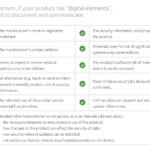Meta, formerly known as Facebook, is now under intense scrutiny as the European Commission launches a significant investigation into the company’s handling of disinformation leading up to crucial elections in the region. The European Commission, the executive body of the European Union, has raised concerns over Meta’s efforts in combating disinformation, especially in light of the upcoming European Parliament elections scheduled for June 6-9.
In a statement released by the Commission, it highlighted suspicions that Meta may not be in compliance with the Digital Services Act (DSA) obligations concerning deceptive advertisements, disinformation campaigns, and coordinated inauthentic behavior within the EU. The Commission also raised issues regarding the alleged demotion of political content by Meta on platforms like Instagram and Facebook, potentially violating transparency requirements.
Responding to the allegations, a Meta spokesperson expressed the company’s commitment to mitigating risks on its platforms and pledged to cooperate with the European Commission by providing further details on their ongoing work to address these concerns.
Implications of the Investigation
The investigation into Meta’s activities falls under the Digital Services Act, a pivotal EU law enacted to monitor tech giants’ content moderation practices and safeguard the integrity of elections against manipulation. This law, in effect since February 17, 2024, mandates that internet companies disclose to users the rationale behind recommending specific content and offer opt-out options.
Furthermore, the legislation requires platforms to provide clear labeling of sponsored advertisements and implement measures to counter misinformation and election manipulation. As part of the probe, the European Commission recently conducted a stress test to assess platforms’ preparedness in combatting manipulative behavior as elections approach.
Should Meta be found in violation of the DSA regulations, the consequences could be severe, including fines amounting to up to 6% of the company’s global turnover. Additionally, failure to comply may result in a temporary prohibition from operating within the EU region.
The Commission has indicated its intent to gather additional evidence from Meta through requests for information, interviews, and inspections. Depending on the findings, enforcement actions such as interim measures or non-compliance decisions could be pursued, with the option for Meta to propose remedial actions to address the identified issues.
While Meta occupies a significant position as a Very Large Online Platform (VLOP) under the DSA, signaling heightened regulatory oversight and potential penalties for non-compliance, the legal timeframe for concluding the investigation remains unspecified.
The European Commission also raised concerns over the availability of effective third-party tools for monitoring civil discourse and election integrity ahead of the European Parliament elections and other votes across individual member states. Specifically, the Commission highlighted Meta’s transition away from the CrowdTangle tool, traditionally used for real-time election monitoring.
Meta, however, defends its decision to phase out CrowdTangle, citing limitations in data availability for effective election monitoring. The company asserts that it is developing new tools to offer more comprehensive data access to researchers, journalists, and civil society groups through its platforms.











